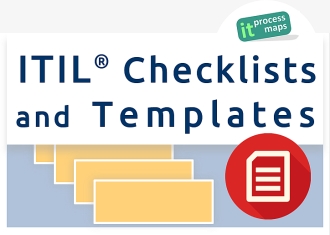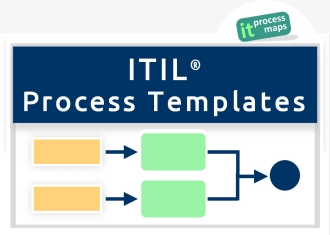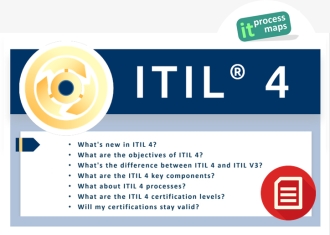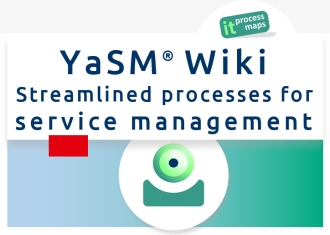Change Management - ITIL V2: Difference between revisions
No edit summary |
mNo edit summary |
||
| Line 1: | Line 1: | ||
<seo metakeywords="change management itil v2" metadescription="→ See also Change Management ITIL V3. Process Objective: ... all Changes to the IT infrastructure and its components (Configuration Items) are authorized and documented, ..." /> | |||
<imagemap> | |||
Image:ITIL-Wiki-deutsch.jpg|right|ITIL V2 Change Management | |||
default [https://wiki.de.it-processmaps.com/index.php/Change_Management_-_ITIL_V2 diese Seite auf Deutsch] | |||
desc none | |||
</imagemap> | |||
<br style="clear:both;"/> | |||
'''ITIL Version''': ITIL | '''ITIL Version''': ITIL V2 '''→''' see also '''[[Change Management|Change Management - ITIL V3]]''' | ||
'''Process-Objective:''' In Change Management, all Changes to the IT infrastructure and its components (Configuration Items) are authorised and documented, in order to ensure that interruptive effects upon the running operation are kept to a minimum. The implementation steps are planned and communicated, in order to recognise potential side-effects as early as possible. The [[Roles_within_ITIL#Change Manager|Change Manager]] and (for further-reaching Changes) the [[Roles_within_ITIL#Change Advisory Board (CAB)|Change Advisory Board (CAB)]] bear the responsibility for this. A specific procedure is in existence for emergencies, dealing with Urgent Changes. | '''Process-Objective:''' In Change Management, all Changes to the IT infrastructure and its components (Configuration Items) are authorised and documented, in order to ensure that interruptive effects upon the running operation are kept to a minimum. The implementation steps are planned and communicated, in order to recognise potential side-effects as early as possible. The [[Roles_within_ITIL#Change Manager|Change Manager]] and (for further-reaching Changes) the [[Roles_within_ITIL#Change Advisory Board (CAB)|Change Advisory Board (CAB)]] bear the responsibility for this. A specific procedure is in existence for emergencies, dealing with Urgent Changes. | ||
| Line 70: | Line 73: | ||
* [[ITIL Glossary#Forward Schedule of Changes (FSC)|Forward Schedule of Changes (FSC)]] | * [[ITIL Glossary#Forward Schedule of Changes (FSC)|Forward Schedule of Changes (FSC)]] | ||
* [[ITIL Glossary#Projected Service Availability (PSA)|Projected Service Availability (PSA)]] | * [[ITIL Glossary#Projected Service Availability (PSA)|Projected Service Availability (PSA)]] | ||
<!-- This page is assigned to the following categories: --> | |||
[[Category:ITIL V2]][[Category:ITIL process]][[Category:Service Support]][[Category:Change Management]] | |||
<!-- --- --> | |||
Revision as of 09:04, 27 July 2011
<seo metakeywords="change management itil v2" metadescription="→ See also Change Management ITIL V3. Process Objective: ... all Changes to the IT infrastructure and its components (Configuration Items) are authorized and documented, ..." />

ITIL Version: ITIL V2 → see also Change Management - ITIL V3
Process-Objective: In Change Management, all Changes to the IT infrastructure and its components (Configuration Items) are authorised and documented, in order to ensure that interruptive effects upon the running operation are kept to a minimum. The implementation steps are planned and communicated, in order to recognise potential side-effects as early as possible. The Change Manager and (for further-reaching Changes) the Change Advisory Board (CAB) bear the responsibility for this. A specific procedure is in existence for emergencies, dealing with Urgent Changes.
Part of: Service Support
Process Owner: Change Manager
Sub-Processes
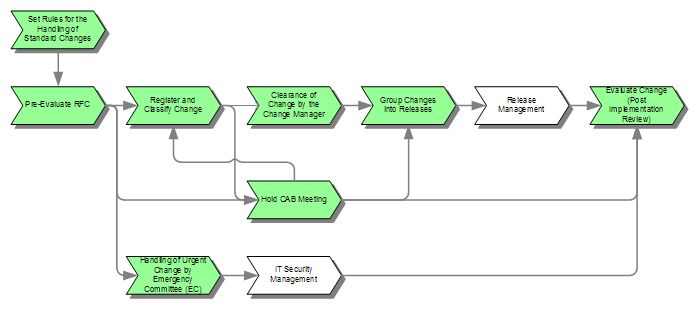
- Set Rules for the Handling of Standard Changes
- Process objective: Rules are to be set that define explicitly for the IT organisation, which Changes are allowed to be implemented without being subjected to the Change Management Process. For this purpose it is also determined, how these Changes ("Standard Changes") are handled.
- Pre-Evaluate RFC
- Process objective: It is to be ensured, that only RFC which are in accordance with the defined quality requirements are accepted into the Change Management Process
- Register and Classify Change
- Process objective: Registration and categorisation of RFCs/ Changes, so that only documented RFCs gain access into the process and are assigned to the correct and appropriate body (Change Manager, CAB, or EC)
- Clearance of Change by the Change Manager
- Process objective: Clearance or rejection of a Change as well as preliminary scheduling and incorporation into the FSC (Forward Schedule of Changes).
- Hold CAB Meeting
- Process objective: Clearance or rejection of a Change, in addition to preliminary scheduling and incorporation into the FSC (Forward Schedule of Changes).
- Group Changes into Releases
- Process objective: Approved Changes are to be grouped into Releases; the clearance for the Rollout is to be issued by Change Management.
- Evaluate Change (Post Implementation Review)
- Process objective: Appraisal of the process and the results of the Change-implementation, so that a complete documentation is present for later reference and lessons may be learnt from any mistakes.
- Handling of Urgent Change by Emergency Committee (EC)
- Process objective: Quickest possible clearance or rejection of an Urgent Change, which is to serve to fight an emergency.
Involved Roles
Related Checklists and KPIs
Checklists
- Checklist Request for Change (RFC)
- Checklist Change Record
- Checklist Change Classification
- Checklist CAB Agenda
- Checklist Forward Schedule of Changes (FSC)
- Checklist Post Implementation Review (PIR)
KPIs


